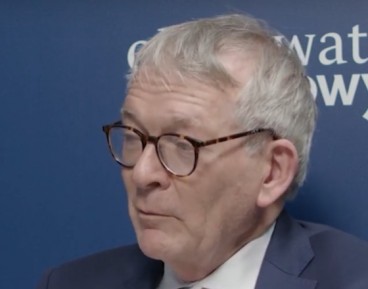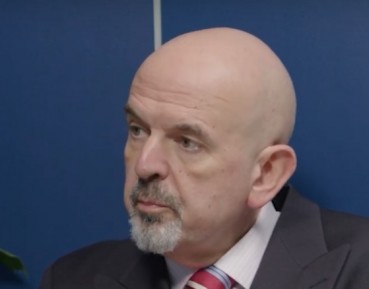David Marsh: Peace agreement in Ukraine may be near
Category: Wideo
You proposed “European Silk Road” in 2019. Is this idea still relevant after the outbreak of the war in Ukraine and what does it involve?
Mario Holzner: Indeed, I think it is still an issue. The basic idea was to have a high-speed rail network over Europe connecting the main cities and agglomerations in Europe, particularly those industrialised areas in the West and those populous regions in the East of the continent that need to catch up further. So, we don’t have any more all of Europe as a potential area where this network can be established, but I think that this is something that could also give the European Union some kind of a project that would unite Europeans to have something useful invested in such as a high-speed rail network.
Do we have some numbers about this European silk road?
Yes. It depends on how big you create this, obviously. It is something very costly – that is true. One would probably speak about half a trillion euros to have a basic network, but I think we need to also see, on the one hand, that this would be a stretched investment over probably a very long period of time. In that sense, in percent of GDP, it is negligibly few in an investment horizon of 15-20 years. And, the other thing is – what can we save? We can save huge amounts of CO2 emissions, because basically if you reduce the travelling time between cities to below 4 hours, you will have a sudden huge shift from air transport to train transport. And, I think there are a lot of destinations in Europe that lie exactly in this distance where trains, which would run, let’s say, around 300 km/h, would really make a difference.
Are the war in Ukraine and the disturbances in Africa and in the Middle East a confrontation between the West and the BRICS countries?
Well, it is one way to look at this string of conflicts, which is stretching in a way at potential future frontlines of these two big blocks, particularly around the US and around China, where this is kind of a cold war to point zero unfolding. So, I think it’s not a completely wrong view to see it that way and that also means that there are potentially additional areas on the stretch from Eastern Europe, Middle East, South Asia, Eastern Africa where we have to be very careful in order to actually prevent further wars happening.
But, I’m wondering – is BRICS a real political entity anyway? As far as I can remember, it was a term coined by Jim O’Neill, and then used by Goldman Sachs, to put a smart tag on a group of countries. Is there something more to it? Is there really a political reality – BRICS countries?
Not really. It’s rather a meeting format for those, let’s say, middle powers. I’m not speaking about China for the moment or maybe even also India, but the others in addition, also the BRICS plus countries, which were invited recently to join the BRICS format, that are, let’s say, middle powers. And, as politologists – even Krastev – say, these middle powers – they don’t want to be on the plate, but they want to be sitting at the table, they want to negotiate their own future, their fate. And, in that sense it makes sense for them to somehow get together and have a certain alignment of their policies. But in essence, there are very divergent interests within this group of countries, and to a large extent it is also China that tries to use this format as a potential meeting place for more or less like-minded countries.
So, it’s China and the rest?
In a way yes, because if you look at particularly the economic, geo-economic, geo-strategic questions that are here also negotiated, that are a topic, then it is really rather China and not the other countries. Oil production is something else. The other countries like Russia, Saudi Arabia, Iran are very important, it’s clear, but, let’s say, for instance in all the metals, rare earths, the elements that are needed for the green transition, it is really China that is the number one processing country for all these things, and not necessarily the BRICS.
You also claim that BRICS will never be politically significant because India will always favour the US over China. But, are China, Russia and Brazil not sufficiently powerful to influence the reality of the world anyway?
Again, there are very divergent interests between Saudi Arabia and Iran and it remains to be seen how that really can fit together, but indeed I think India is the key country if we look from now on into the future, let’s say – 50 years from now. Already now India has overtaken China as the most populous country. The structure of the Indian economy is very different from the Chinese one – the pockets of modernisation in India are very similar to Western IT and business services industries. So, I’m not speaking even about the political conflict that India and China have over Kashmir and similar issues; I think there is just not enough overlap between India and China, at least from today’s perspective, to really build a core of such a BRICS counterweight, let’s say, to the West.
Could the West have done something more to supress the current anger against itself, for example, pursue a more multipolar policy, or was the confrontation with BRICS, with particularly China and Russia, unavoidable anyway?
That is a hard question. I would maybe not focus on China and Russia in my answer, and rather maybe on the other countries – those, let’s say, middle powers. I think indeed the West has lacked in the way of a partnership and true friendship, if you wish, with these other countries, offering them also possibilities of sustainable development in a partnership, offering much-needed investment in the infrastructure. I mean, for instance, the European Union with the Gateway Programme – we are now trying to somehow make up for these lost decades before where we’ve been really trying to make friends in the region.


